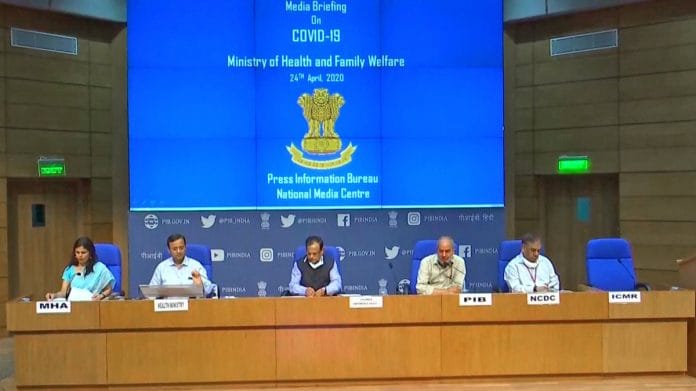New Delhi: The nationwide lockdown in India was timely and if it wasn’t imposed, the country would have seen over 1 lakh positive cases, according to V.K. Paul, NITI Aayog member and chairperson of Empowered Group 1, one of the 11 groups formed to tackle the Covid-19 outbreak.
The lockdown in India became a ‘Jan Aandolan’ (public movement), he said at a media briefing Friday.
Paul added the doubling rate of the Covid-19 virus on 21 March was three days, which has gone up to almost ten days over the last few days due to several steps taken by the Government of India.
While India was able to increase the doubling rate from three days to five days with “incremental steps” like imposing travel restrictions and creating an atmosphere of social distancing, it has been able to reduce it further with bigger steps such as a national lockdown, he added.
The effects of the lockdown will continue to be seen until the second week of May, said Paul.
Prime Minister Narendra Modi had announced a three-week nationwide lockdown from 25 March, which was further extended until 3 May.
Also read: ‘Had you not been PM’ — praise and a poem for Modi during video chat with sarpanches
Recovery rate has increased to 20.57%
At the briefing, when asked if there is a possibility of an extension of the lockdown, Director General of the Press Information Bureau Kuldeep Dhatwalia said it is “too early” to say anything.
Health Ministry Joint Secretary Lav Agarwal said there were 1,684 new Covid-19 cases in the last 24 hours — taking the total tally to 23,077.
The recovery rate has increased to 20.57 per cent, he added at the briefing.
On 9 April, at a media briefing, the Ministry of External Affairs Secretary (West) Vikas Swarup had said India would have had up to 8.2 lakh positive cases by 15 April had it not been for the 21-day nationwide lockdown.
Swarup had said the 8.2 lakh figure was based on a study by the Indian Council of Medical Research (ICMR).
4 more teams formed for Covid inspection in states
Joint Secretary, Home, Punya Salila Srivastava said the government has constituted four more inter-ministerial central teams (IMCTs), which would be sent to Ahmedabad, Surat, Hyderabad and Chennai for on-spot assessment of the Covid-19 situation there.
The government also shared the findings of two of the earlier IMCTs, constituted by the home ministry, which were sent to Indore and Mumbai.
Agarwal said the teams met senior officers, examined the containment zones, hospitals and critical management of patients, contact-tracing techniques, etc. and made some recommendations to the state governments as well.
Speaking of district-level surveillance carried out by the government, Dr Sujit Kumar Singh, director of the National Centre for Disease Control, said the Centre is maintaining a live dashboard that captures real-time data from the district level, and also the status of beds and PPEs in each district.
He said nearly 9,45,000 people are currently under surveillance and they have been divided into high and low-risk categories.
Also read: Plasma therapy on Delhi Covid-19 patients yields positive results, say Kejriwal & top doctor






